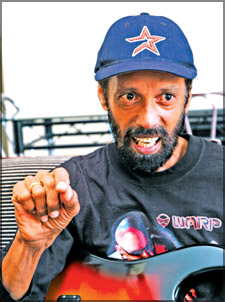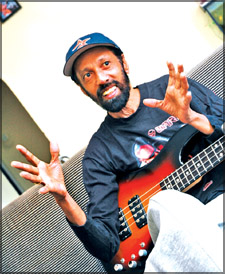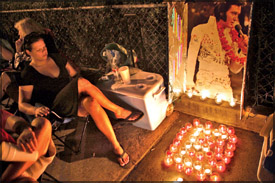|

Thilak, a life based on bass
Chamikara Weerasinghe
Thilak Dias is not just another bass player because you know when you
listen to him sooner or later you will hear one or two bass runs which
will mark the presence of the man, the beard, the cap and the smile he
is wearing.
 Thilak Dias has been playing bass guitar from the age of 20 from mid
70s. You may have seen him playing with many local bands including Sri
Lanka's top bands like Gypsies. He even did his bit to back the late
Sinhala pop icon Clarence Wijewardena. Thilak Dias has been playing bass guitar from the age of 20 from mid
70s. You may have seen him playing with many local bands including Sri
Lanka's top bands like Gypsies. He even did his bit to back the late
Sinhala pop icon Clarence Wijewardena.
Thilak has the ability to adjust his playing to suit any music genre
be it pop, rock or baila. The vastly experienced recording artist has
toured many countries including Switzerland, Denmark, US and Japan to
make his four-stringed instrument ring with his standard.
Thilak Dias was met by In Tune last Tuesday at his residence at
Papiliyana for an interview. We learnt that the artist was planning to
virtually retire from the fast track to do a few instrumentals of his
own with him soloing on the bass. Following is our interview with Thilak.
In tune: Must you retire?
Thilak: Let me put it this way. I want to compose a few tracks. I can
do them at home without having to run up and down and all over the place
with the use of my computer to record the tracks.
Seclusion is necessary to find what you can do.
In Tune: So what do you do besides composing these tracks?
Thilak: I teach bass guitar. It is very interesting.
In tune: why?
Thilak: People think bass playing is easy. This is exactly what I
thought when I first held the instrument. There is always something new
to learn. There is always something to learn from other bass guitarists.
In Tune: what is your point?
Thilak: It is sometimes surprising that some guys who are quite new
to bass playing do not show any inclination to learn from senior
players. I have seen some players struggling in the middle of the road
of their musical career because of this problem. inclination to learn from senior
players. I have seen some players struggling in the middle of the road
of their musical career because of this problem.
In tune: Do you have any advice you like to offer to musicians in
your trade?
Thilak: Listen to good bass players like Lewis Johnson and Stanley
Clerk. Listen to bands like Deep Purple, Led Zeppelin, Grand Funk
Railroad and Uriah Heap if you are a rock fan. Get inspired. That's how
you get started. Learning has become too easy for the youth with the
development of computer technology.
In Tune: Why do you say so?
Thilak: When we started playing in the 70s and 80s we could only
imagine that this was how they had played a favourite riff. But today
you can watch them. There are plenty of DVDs, Internet courses and like
things which are readily available in the market for the purpose of
learning music.
In tune: Is it good?
Thilak: Yes. But it has its negative effects building around it. For
example , players have become lazy because of their being exposed to
computer software. They do not practise the way we used to. Even today I
play the guitar five to six hours. The young crowd are lazy compared to
what we did for practising. If you get lazy you cannot maintain your
position.
Now everything is at your fingertips. Those days we had to wait for
months to listen to a new song which has been released in England or
America. We have to lend our ears to the radio to listen to a new song.
We scarcely get any chance to witness the players or singers.
The only thing available to us was the cover of a record or a tape.
These days you don't have to wait. Everything is right in front of your
computer screen to be seen or heard.
In tune: How did you start your musical career?
Thilak: I lived down the Beach Road of Mount Lavinia, where I had
friends who liked music. I started with an electric rhythm guitar
because I didn't have a bass guitar.
We formed Rattlesnakes in the mid 70s.
In tune: Any local influences in your musical career?
Thilak: I was inspired by bands like Savages with Raj Seneviratna and
Jet Liners with Minon Rathnam in my early years.
In tune: How did Rattlesnakes start making sounds?
Thilak: We did not have any sounds. We did not have a drum for practising. So we made a drum.
There was a hardboard wall where we had our practice sessions. We had
a foot pedal placed near that hardboard as an alternative for a bass
drum. We had a thick comic book to hit to serve the purpose of a snare
drum. The symbol was as tiny as one's palm.
The lead guitar was jacked to a small radio unit. There was another
radio which we fixed the bass guitar. Rhythm guitar was played with a
box guitar unplugged. No mikes whatsoever for the voice.
We start practising in the evening and it goes till very late.
The original members of the band were Rohan Karunaratna on drums,
Bandula Dias was on bass and me on the lead guitar.
In Tune: And your musical experience with Gypsies.
Thilak: That is where I was really exposed. Gypsies were playing
their originals and mostly pop. I could add some flavour to their music
with my skills and back ground.
Gypsies was a professional outfit. They were very keen on what they
were doing. Even a simplest of song , they would practise for days
before they play that on stage. It was wonderful experience with them.
In Tune: You are never seen on stage without your beard. Any
particular following behind that. I remember George Harrison of Beatles
used to have a beard.
Thilak: Let's say I am an admirer of Che.
In Tune: Your experience with reggae music.
Thilak: I was playing at hotels in the Southern region for quite some
time. We had to play reggae. Because it was the era of reggae and
tourists love reggae. So did we with Bob Marley's influence which was
enormous those days.
In Tune: Do you consider yourself as a rock musician?
Thilak: By playing rock music alone you cannot earn much money in Sri
Lanka.
The marketing of an icon: Elvis as a brand
Elvis is pulling in more money 30 years after his death than he did
at the height of his career as his iconic image graces everything from
the tackiest of ceramic sculptures to slick ad campaigns.
His face, his hair, his jumpsuits and his stance are instantly
recognizable and they adorn just about everything imaginable, and much
that is unbelievable.
A hundred merchants set up shop an Elvis week expo in Memphis to ply
their wares to the devoted fans who came to pay from across the globe to
pay their respect to the King.
|

Suzi Tuberville from Memphis, Tennessee, sits in the candlelight
beside her memorial tribute to Elvis Presley during a vigil
outside the front gates of Graceland Mansion, the home of Elvis
Presley, 15 August 2007 in Memphis, Tennessee. This week marks
the 30th Anniversary of the death of the Rock & Roll legend. |
There are - of course - the decorative plates, the posters, the
blankets, the lighters, the watches, the jumpsuits and the playing
cards.
But Elvis boxer shorts? A singing, animatronic bust of Elvis?
Organic, fair-trade Elvis coffee and California-grown Elvis merlot and
shiraz?
Ari Heino of Finland dropped 87 dollars on a replica of a horseshoe
ring that was designed by Elvis in the 1950's. There were others on sale
for ten dollars, but this one looked like a closer copy.
"It's not gold, but maybe someday I'll make it solid gold," the
56-year-old banker told AFP.
Everything in the expo is licensed by Elvis Presley Enterprises,
which carefully manages him image and rejects all but about two percent
of the thousands of requests it receives every year to use the Elvis
image and name.
"The tacky unlicensed merchandise, that's a continuous and ongoing
battle that is fought by our legal department," said Jack Soden, chief
executive officer of Elvis Presley Enterprises.
These losses are small change compared to the millions made through
licenses to deep pocketed merchandisers like Hershey's, which has
launched a limited edition peanut butter and banana Reese's cup in
honour of the King's favourite sandwich. But the battle is waged to
protect the value of the Elvis brand, although Soden prefers to use the
word legacy.
Unflattering products are simply disappeared from the market place.
And footage of Elvis in his last days, when he was overweight and
forgetting lyrics on stage, is kept locked in the vault, something Soden
compared to sticking an unflattering photo at the bottom of the drawer.
Elvis Presley Enterprises pulled in 48 million dollars last year, about
13.6 million of which came from licensing.
That figure is expected to grow rapidly under the management of
billionaire Robert Sillerman, who bought an 85 percent stake in the
company for over 100 million dollars in 2005.
"The Presley family - Lisa Marie and Priscilla - never had the money
to really market Elvis the way he should have been," said Amos Maki, a
reporter at the Memphis Commercial Appeal who covers the business side
of Graceland.
(AFP) |

